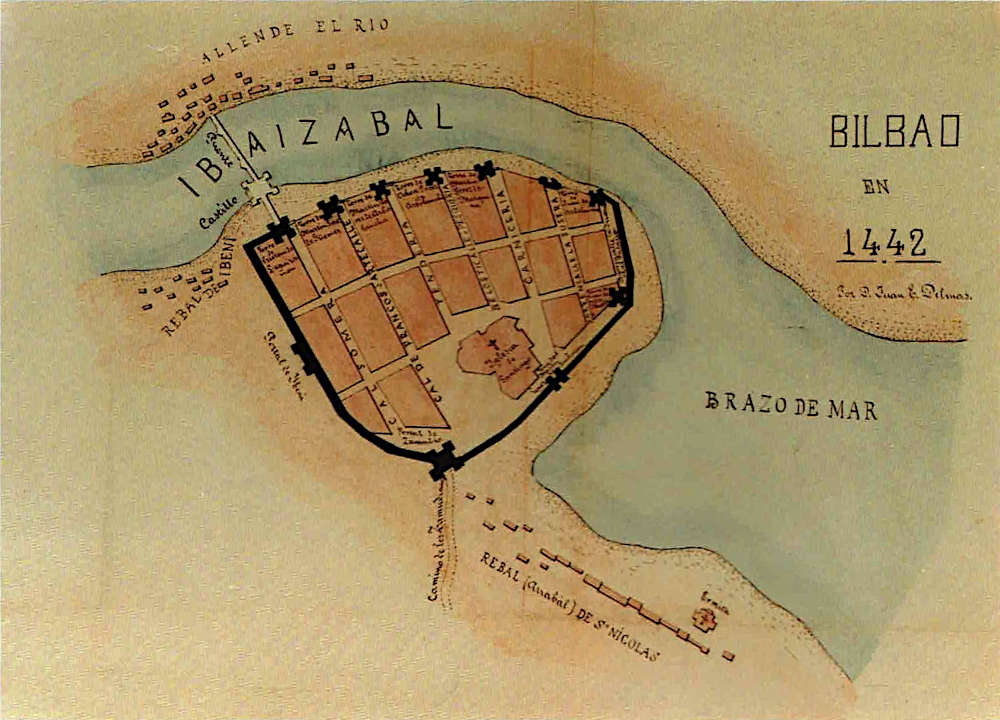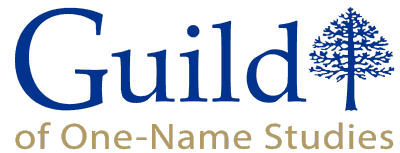Robert Melhuish of Bilbao, Merchant
 30 years ago I was scrutinising a photocopy of a hand-drawn chart of the Witheridge and Northam branch of the Melhuish family when I spotted a tiny entry: Robert of Bilbao, merchant. At the time I was doing a lot of business with companies in the Spanish Basque Country so this really caught my attention and I just had to investigate further.
30 years ago I was scrutinising a photocopy of a hand-drawn chart of the Witheridge and Northam branch of the Melhuish family when I spotted a tiny entry: Robert of Bilbao, merchant. At the time I was doing a lot of business with companies in the Spanish Basque Country so this really caught my attention and I just had to investigate further.
Three different genealogies all showed Robert to be a first cousin of Richard Melhuish of Appledore Estate fame. Robert features in the Witheridge parish register as having been baptised in 1674. Two of the genealogies give his death as 1708 though I've never been able to get a primary source confirmation of this. Perhaps he died in Spain. Neither have I been able to trace any marriage or children, but again, perhaps he married in Bilbao.
On my next visit to Bilbao I took time out to go to the Basque Country Museum in the old quarter of Bilbao to see if I could learn more. Time was against me but the librarian there promised to do some digging and send me anything she was able to find. Sure enough, a couple of weeks later I received a letter along with some photocopies from two books. The letter read:
Dear Friend
I am sending you the information that I have been able to find about your ancestor Robert Melhuish. I can't find that exact name amongst the merchants based in Bilbao around the end of the 17th - beginning of the 18th centuries. However there is a "Roberto Melyusse", an English merchant operating in the field of import/export of wool between 1680 and 1690. It's impossible to say for sure if he is the person you're looking for, but it's not entirely improbable. In case it is helpful for your future studies I am enclosing photocopies from the books where he appears.
Best regards
Marian
The text in the two extracts were very similar but each added a little bit of information that the other lacked. Pulling it all together and making my best translation of some old-fashioned Spanish, they gave me the following:
In the XVIII century, the wool trade was highly regarded and was seen as the jewel of Bilbao and it's main product line. The way of doing business at that time was carried over from the previous century with the raw wool piled into tubs and large sacks. Merchants got a credit at the time of shipping and had 6 months to pay their debts.
A feudal memo from Burgos and Santander written about 1726 making the case to attract commerce done by foreigners in Bilbao describes how the wool trade worked.
At the beginning of the last century commerce in Bilbao was reduced to cod fishing, whaling and the internal trade with other parts of Spain. Wool was transported from Castille to Bilbao and sold to the foreign merchants in exchange for their manufacture. From Britain alone the following people were involved in the buying and selling of wool during the 10 years from 1680 to 1690.
Enrique Beabis, Joseph Chamberlan, Elías Rusel, Juan Paige, Juan Símon, Juan Staford, Samuel Reynolds, Juan Choc, Andrés March, Gisberto Graymes, Roberto Melyusse, Jorge Tucher, Juan Roe, Roberto Aymes, Juan Clarke, Jorge Ricardo, Diego Ricardo, Nicolás Wod, Juan Day, Guillermo Goselin, Enrique Sanford, Juan Titcomb, Roberto Michel, Enrique White, Juan Odcot, Benjamin Michel, Jorge Cliford, Walter Champernone, Abram Lordel, Enrique Champernon, Juan Seale, Pedro Seale, Enrique Tite, Jorge Tite, Gullermos Franckland, Samuel Still, Thomas Croch, Guillermo All, Thomas Ayter, Daniel Dambrynne, Marcos Weyland, Roberto Utchings, Juan Rouse, Guillermo Varones, Juan Chort, Juan Atanchirt, Enrique Chapman, Joseph Earle, Thomas Earle, Roberto Earle, Esteban Arbey, Francisco Buselin, Juan Goselin, Enrique Gray, Pedro Lapipe, Guillermo Salter, Andrés Broughton, Andrés Quash, Roberto Quash, Thomas Wilson, and Ricardo Reobe. Altogether they amount to sixty one, bearing in mind that there might be others not mentioned, but they would be no more than five at most.
It can be seen in that list of English merchants nearly all the christian names have been converted to their Spanish form and quite a lot of surnames have been mangled by the Spanish clerk who was probably writing what he thought he heard mixed with copying some difficult handwriting. Hence I would guess that Tucher=Tucker, Wod=Wood, All=Hall, Ayter=Hayter, Utchings=Hutchins, etc. We all know how difficult Melhuish is even for English people so it doesn't seem any sort of stretch of the imagination to think that Melyusse=Melhuish.
Historically the area across the middle of Devon from Bideford, past Chulmleigh, Witheridge and Crediton to Exeter was an important centre for wool spinning and weaving. It would seem that Robert was buying raw wool in Bilbao that had been brought down by packhorses and shipping it to England, probably Appledore or Bideford. His family were heavily involved in shipping so perhaps he had his own vessel or used one belonging to a relation. Then he was probably shipping finished woollen yarn or fabric back to Bilbao, hence keeping his ship full both ways.
There is just one doubt that occurs in all of the above. If Robert was born in 1674 as his baptism indicates, he would have been only 16 years old in 1690. His birth is unlikely to be significantly before 1674 as his parents were married in 1671. Therefore either he was an extremely young entrepreneur or the period 1680-90 mentioned in the Spanish books actually extended to later than 1690. As everything else fits so well, I am inclined to favour the latter.
The historic quarter of Bilbao is still called Las Siete Calles (the Seven Streets) and the reason is clear in this map dating from 1442. By the time of Robert of Bilbao, little had changed as can be seen in the engraving further up this page which shows the city in 1700.
27 Jun 2023, 17:37



